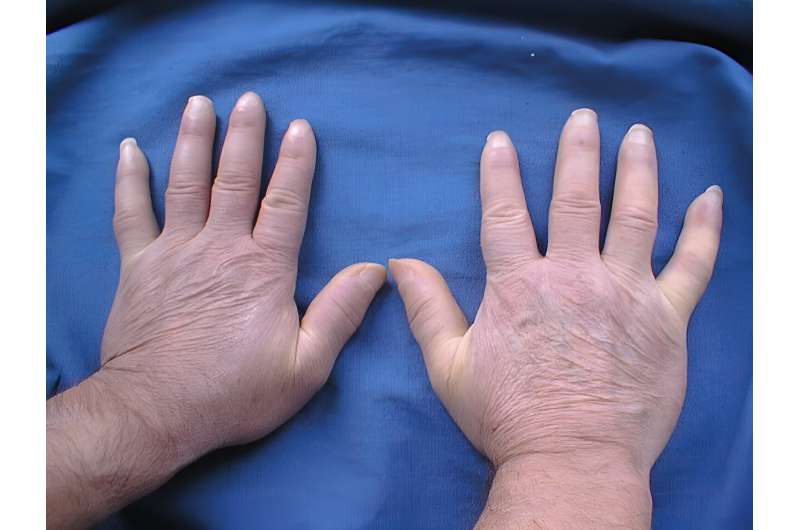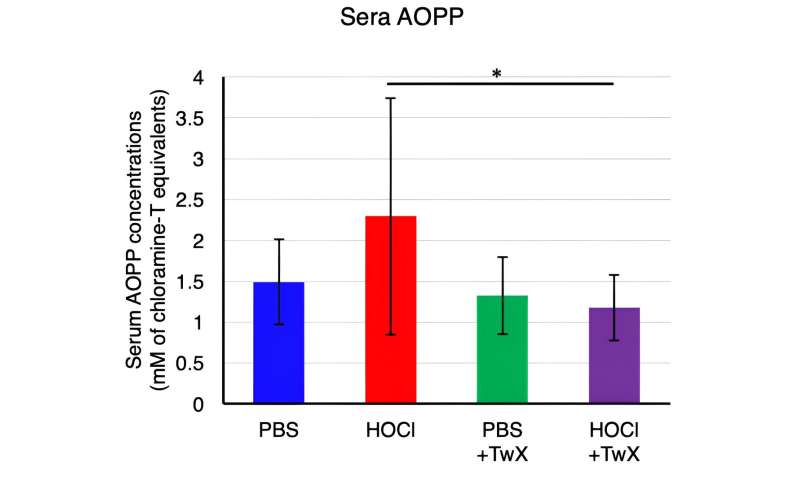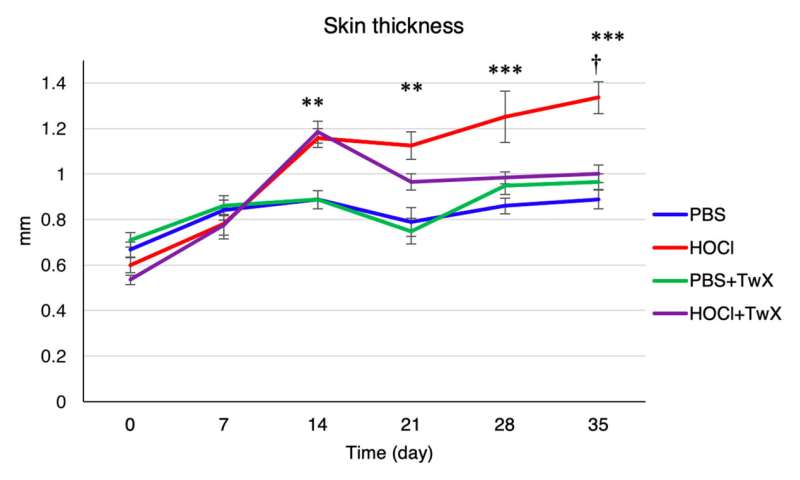This article has been reviewed according to Science X's editorial process and policies. Editors have highlighted the following attributes while ensuring the content's credibility:
fact-checked
peer-reviewed publication
proofread
Study finds antioxidant dietary supplement may help counter systemic sclerosis

Autoimmune diseases occur when the body's immune system attacks healthy cells instead of protecting them. Systemic sclerosis (SSc) is one such autoimmune condition characterized by faulty circulatory and immune systems, leading to the occurrence of fibrosis (hardening and scarring of healthy tissue) of the skin and internal organs.
SSc is known to affect patients throughout their lives, thereby, impairing their quality of life. Although precise mechanisms underlying SSc development and progression are not clearly understood, a complex interplay of immune, hormonal, environmental, and genetic factors is often implicated.
Moreover, around 90% of the patients with SSc are known to experience a phenomenon known as the "Raynaud's phenomenon (RP)." It is associated with spasms in smaller blood vessels, leading to decreased blood flow. RP can, in turn, promote an increase in the generation of molecules called reactive oxygen species (ROS). The resulting oxidative environment triggers cell damage and fibrosis, further exacerbating the disease.
Countering oxidative stress using antioxidant compounds, is therefore, being increasingly explored as a therapeutic strategy. However, a single antioxidant may not be therapeutically effective in decreasing oxidative stress.
To this end, a team of researchers from Japan, led by Professor Haruhiko Inufusa, who is the Chief Research Scientist at the Louis Pasteur Center for Medical Research, and a distinguished faculty at the Division of Anti-Oxidant Research, Life Science Research Center, Gifu University, has investigated the effectiveness of Twendee X (TwX)—a dietary supplement comprising of a combination of eight active antioxidants—in reducing oxidative stress in SSc mouse models.
Explaining the rationale behind their work published on March 6, 2024, in the International Journal of Molecular Sciences, Prof. Inufusa says, "Studies have shown that TwX reduces ROS, protects mitochondrial function, and improves cognition and memory. Daily oxidative stress care with this supplement can contribute not only to daily health maintenance and disease prevention but also to the symptomatic improvement of intractable diseases like SSc."
-

Twendee X (TwX) was shown to reduce oxidative stress reflected by the serum advanced oxidation protein product (AOPP) levels in SSc mice models created by injecting hypochlorous acid (HOCl). The SSc mice were compared with healthy mice injected with phosphate-buffered saline (PBS). Credit: Haruhiko Inufusa from Louis Pasteur Center for Medical Research https://www.mdpi.com/1422-0067/25/5/3064 -

Twendee X (TwX) was shown to reduce skin fibrosis reflected by skin thickness in SSc mice models created by injecting hypochlorous acid (HOCl). The SSc mice were compared with healthy mice injected with phosphate-buffered saline (PBS). Credit: Haruhiko Inufusa from Louis Pasteur Center for Medical Research https://www.mdpi.com/1422-0067/25/5/3064
The eight constituents of TwX include vitamin C, L-glutamine, niacin, L-cystine, coenzyme Q10, vitamin B2, succinic acid, and fumaric acid. The combined antioxidant effect is likely more potent than the activity of either compound alone. Previous studies have demonstrated improvement in cognition, memory, and motor coordination in mouse models of dementia, and reduction in affected region size, oxidative stress, and inflammation in mouse models of ischemic stroke following treatment with TwX.
Based on these findings, the researchers conducted this study to investigate the effects of TwX in a mouse model of SSc created using hypochlorous acid (HOCl).
HOCl induction led to a significant increase in the serum levels of advanced oxidation protein products (AOPP), mimicking SSc-like features. Further HOCl induction led to the thickening of skin tissues along with local and systemic inflammation, fibrosis, and vascular injury.
Notably, the AOPP levels of mice treated with TwX were substantially lower than that of the healthy animals. Moreover, TwX treatment significantly reduced skin thickness, accumulation of the collagen protein, skin levels of hydroxyproline—an oxidative stress marker, and fibrosis of the skin and lungs.
Additionally, TwX treatment significantly reduced the levels of α-smooth muscle actin (α-SMA), a protein that was elevated in response to HOCl induction and has been shown to activate ROS in fibrotic diseases. HOCl-induced animals treated with TwX also demonstrated a decreasing trend in the levels of inflammatory cytokines and activated immune cells involved in inflammatory responses.
Overall, these results suggest that TwX may treat SSc by regulating oxidative stress, and reducing skin and lung fibrosis. Since these findings were observed in a mouse model, further studies will be needed to establish the effectiveness of TwX in human patients with SSc. Nevertheless, given the benefits of TwX in other oxidative stress-related diseases as well as the lack of side-effects, TwX holds significant promise as an antioxidant therapeutic against SSc.
Prof. Inufusa says, "Although TwX is a dietary supplement, it has passed drug-level safety testing and can be used by a wide range of people, from children to adults. Moreover, our findings suggest that TwX could potentially alleviate the symptoms of intractable oxidative stress-related diseases such as SSc."
More information: Fukka You et al, The Potential of Twendee X® as a Safe Antioxidant Treatment for Systemic Sclerosis, International Journal of Molecular Sciences (2024). DOI: 10.3390/ijms25053064


















